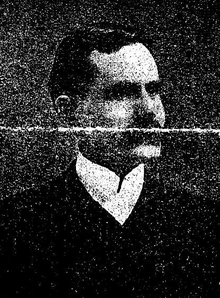Charles Lincoln White
Charles Lincoln White (January 22, 1863 – 1941) was the 13th President of Colby College, Maine, United States from 1901–1908.
Rev. Charles Lincoln White | |
|---|---|
 | |
| 13th President of Colby College | |
| In office 1901–1908 | |
| Preceded by | Nathaniel J. Butler |
| Succeeded by | Arthur J. Roberts |
| Personal details | |
| Born | January 22, 1863 Nashua, New Hampshire |
| Died | 1941 Hampton Falls, New Hampshire |
| Spouse(s) | Margaret Donalda Dodge
( m. 1891; died 1928)Annie H P White ( m. 1930) |
| Children | Jessie Dodge, Harriet Dodge, Katharine Dodge, Clarissa Dodge, Mary Dodge |
| Alma mater | Brown University |
| Profession | Pastor |
| [1] | |
Early life
White was born in Nashua, New Hampshire, to George and Harriet Richardson White. He was educated at Woburn High School and graduated from Brown University in 1887 where he was a member of Delta Upsilon,[2] and Newton Theological Institution in 1889.[1]
Career
He was pastor at Somersworth Baptist Church, New Hampshire from 1890-1894, and the First Church of Nashua from 1894-1900.
Presidency
He was called to the presidency of Colby College in June 1901, having served as the general secretary of the New Hampshire Baptist Convention the year previous. He remained at the head of the college until 1908.[1]
Foss Dining Hall was built in 1904, named after Eliza Foss Dexter, from whom he coaxed the money.[3]
Post-Presidency
He received the degree of D. D. from Bowdoin College in 1902. After his presidency, he moved to Brooklyn, NY with his family and worked as a manuscript secretary.
Published works
- Charles Lincoln White (1915). The Churches at Work. Smith & Lamar. (still in print)
- —— (1916). The Children of the Lighthouse. Illustrated by H. B. Dummer. Association Press.
- —— (1916). Lincoln Dodge, Layman (3rd ed.). American Baptist Pub. Society.
- —— (1932). A century of faith. Pub. for the American Baptist home mission society by the Judson Press.
References
- "The Teachers of Waterville by Arthur J. Roberts". The Centennial History of Waterville, Kennebec County, Maine, June 23d, 1902. 1902. p. 504.
- Colby College Echo, "President White", October 4, 1901
- Smith, Earl H. (2006). Mayflower Hill: a history of Colby College. Colby College. p. 111. ISBN 9781584656043.